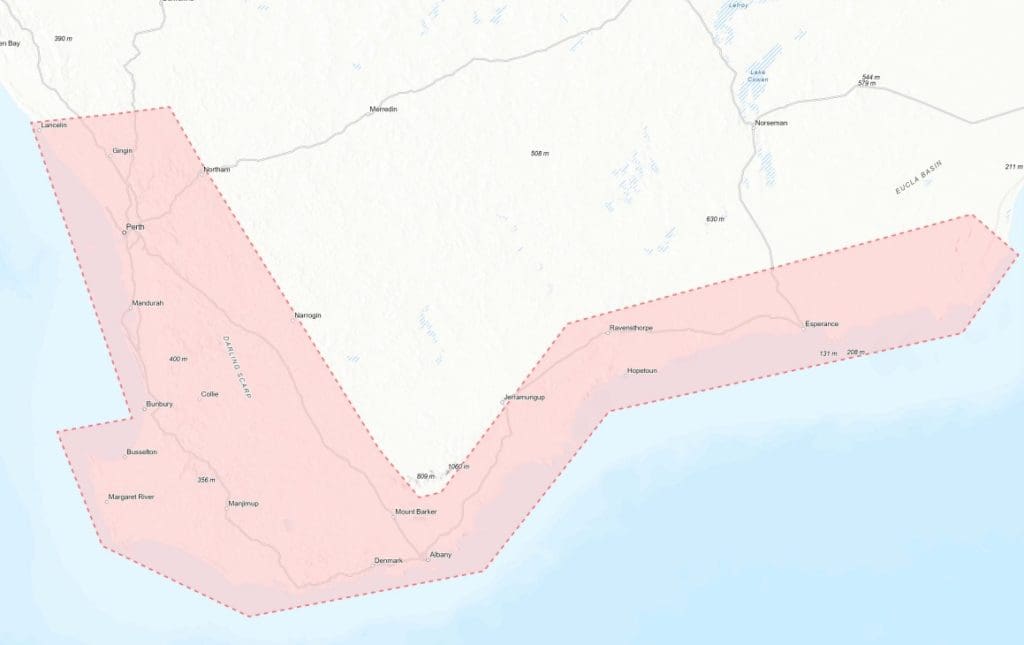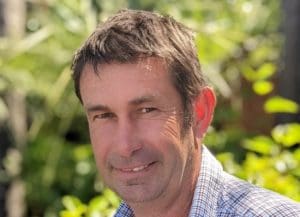
The green snail area infestation map. Image – PIRSA.
SOUTH Australia has waived biosecurity inspection fees for drought-impacted SA farmers importing fodder from interstate and updated import requirements for hay from Western Australia.
Although biosecurity inspections of imported hay will continue, Department of Primary Industries and Regions SA said those farmers impacted by drought will have their fees waived.
Eligible farmers will receive rebates for inspection fees paid since November 2024, when the first drought package was announced, but will need to contact the Drought Hotline 1800 931 314 to seek reimbursement.
Conditional entry for WA hay into SA
Late Friday last week South Australia also granted conditional entry to hay from areas of Western Australia with a lower risk of green snail infestation. The green snail has caused damage to cabbages, cauliflowers, lettuces, peas, beans, wheat, lupins, pasture grasses and native plants. Concern about its potential entry into SA had stopped WA hay imports.
A Department of Primary Industries and Regions SA statement said South Australia has reviewed its import conditions relating to hay imports from Western Australia to bring them more into line with those that are applied by NSW and Victoria.
PIRSA said conditional entry of hay from lower-risk areas of WA see linked map (PDF 702.4 KB) is permitted on a case-by-case basis. Approval for entry is subject to the following conditions:
- Each consignment must be accompanied by a Plant Health Import Certificate (PHIC) and a Biosecurity Declaration that clearly identifies the origin of the hay.
- All consignments must be sealed / covered during transport to prevent spillage.
- A detailed manifest must be submitted to PIRSA prior to arrival, in accordance with existing procedures.
- PHIC applications can be made by applying online here or emailing [email protected]
- Upon arrival in SA, consignments will be inspected by either a business registered with PIRSA or PIRSA Biosecurity Officers.
Border security and fee changes welcomed by SA producers
South Australian livestock producers, including Thornby farmer Alex McGorman, have been organising hay shipments from SA, the Northern Territory and Queensland after bulk sources dried up in SA, New South Wales and Victoria.

Alex McGorman
Mr McGorman thanked Livestock SA for working to overcome the biosecurity and inspection fee issues. He said PIRSA had been charging $172/hour for biosecurity inspections in quarantine areas on farms.
“One bloke who had got four loads in, it cost him $270 per load to get the inspections.
“There probably hasn’t be a heap of hay come in, but there will be.”
Mr McGorman said as the season continued he expected more hay will come in from Queensland, the Northern Territory and Western Australia.
Oaten and vetch hay from Western Australia can be landed in South Australia at the McGorman family’s ‘Thornby’ property east of Adelaide for about $500-$590 a tonne, with less for grass hay, including a $250/tonne freight component. Freight costs out of the territory are around $200/tonne.
“We’re feeding out a semi and a half a week.”
He said the WA access and biosecurity fee decisions negotiated by Livestock SA with PIRSA were “very good moves.”
Livestock SA continues to lobby for freight subsidy
Livestock SA has welcomed the South Australian Government’s decision to allow hay to be accessed from parts of Western Australia.
Consignments will be assessed on a case-by-case basis and subject to certain conditions, the producer lobby group said.
The agreement follows ongoing discussions between Livestock SA and the Department of Primary Industries and Regions about biosecurity restrictions that have prevented hay from WA being brought into South Australia due to the presence of green snail.
Livestock SA said the PIRSA website has now been updated with the revised WA green snail zones and covers the requirements for commercial hay imports including the biosecurity risk zones for green snail in WA and Victoria, and Red Imported Fire Ant in New South Wales and Queensland.
Livestock SA chief executive officer Travis Tobin thanked the state government for working quickly with Livestock SA to address the issue and said the decision was a positive step for producers struggling to source available and affordable feed.
“We know the competition and cost of sourcing fodder is increasing by the week, so it is important that we provide producers with as many options as possible to help them keep animals fed, particularly key breeding stock.
“We also understand the importance of maintaining strong biosecurity, which is why experts have been involved to ensure it wasn’t compromised by opening up the low-risk areas of WA,” Mr Tobin said.
Mr Tobin said Livestock SA is continuing its efforts to convince the government that a freight support program is urgently needed.
“The argument that freight subsidies distort the market no longer stands as government funded activities for flood relief in Queensland and New South Wales have already had that effect.
“Drought impacted livestock producers in our state must be able to compete for interstate fodder on level terms,” he said.
“A freight support program needs to include:
Subsidies for transporting stock to and from agistment; transport stock to sale or slaughter; transport fodder or water to stock on drought affected properties.
Emergency permits made available to enable road trains on key freight routes to reduce costs.
Vehicle registration concessions for primary producers using their own trucks and trailers.”
For further information, please contact the Plant Health Market Access hotline on 08 8207 7814 or [email protected].

This sort of government regulation is too much. I saw biosecurity people at work in Tasmania at a sheep sale. They were hopeless. They did not look for lice or footrot. The job is a holiday, compared to what farmers go through. Council mowers are not inspected before doing road sides, I bet — that’s a big weed spreader.